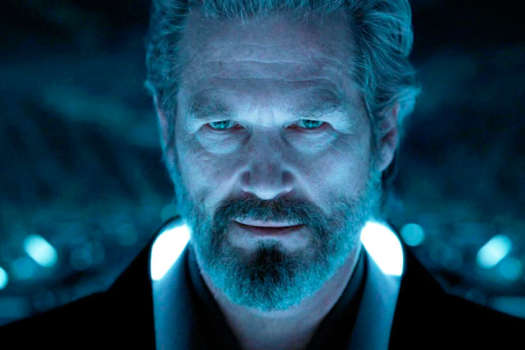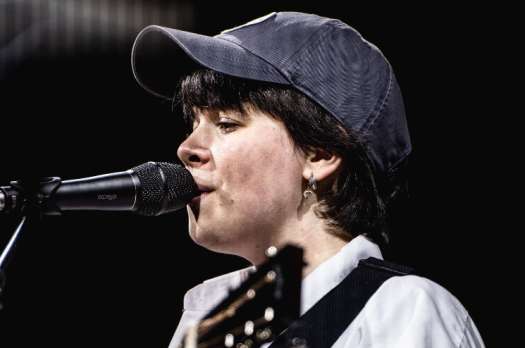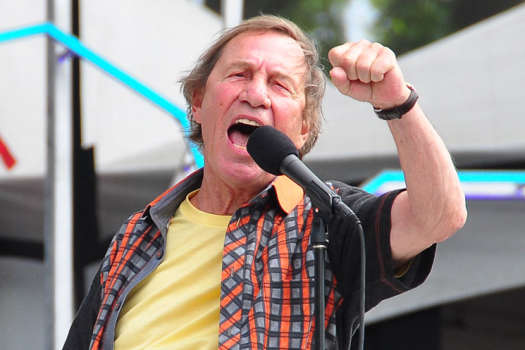It's a common artistic dilemma: a musician releases a defining work early, then faces the struggle of following it up.
"This has been such a long process for me," Carly Rae Jepsen says of the years-long making of her new album. Dedicated, her fourth full-length, is two weeks from release, and the Mission, BC-born singer and songwriter is "excited and nervous."
"As soon as I turned it in, there was a brief moment of panic, almost, that I was done something that had taken so much time, so much of my attention."
It's not surprising that Jepsen would face such a conundrum; what's unusual is that this is the second time in her young career she's had to.
After placing third in the fifth season of Canadian Idol in 2007, Jepsen released a folksy, guitar-based debut LP in 2008. But her career shifted irrevocably when she pivoted to glossier, Top 40-style synth-pop in 2011, and released the single "Call Me Maybe." When Justin Bieber tweeted about the earworm months later, it went viral: "Call Me Maybe" was everywhere, and Carly Rae Jepsen was suddenly a household name.
"[It] was like a shot to the veins," Jepsen says now. "I was in Canada, and then suddenly I was in Mexico opening for Justin Bieber in front of 300,000 people, asking myself 'What does one do with their hands?!' It was terrifying."
The best break anyone could ever ask for quickly became the worst thing for her career — the song came to define her almost immediately.
"I feel like four months after the song reached the top of the charts, it was already decided that I was a one-hit wonder. I was like, 'Can you give me a sec? I have other songs I wanna share!'"
Seven years later, Jepsen has released two albums and an EP's worth of songs, and established a trademark style along the way; her songs freeze significant moments in life and love and blow them up widescreen into larger-than-life pop songs that are alternately celebratory and cathartic. And while her new album maintains her signatures — unforgettable choruses, warm '80s synths — Jepsen has matured in the long four years since her last record.
With Dedicated, the 33-year-old has crafted a more subdued, emotionally nuanced collection that will resonate with anybody who's been through the romantic wringer.
Getting it out, though, has been the toughest challenge of Jepsen's career. It took travelling to multiple countries, a breakup, new love, and expectations both internal and external for Jepsen to deliver Dedicated, far surpassing what she calls the "different pressure" of transcending the success of "Call Me Maybe."
"I think the thing I had on my side," she says now, "was time."
Jepsen wasn't always afforded time.
When "Call Me Maybe" blew up in 2012, she was urged to rush out a second album; Kiss was designed to capitalize on the single's blockbuster success, and while it earned favourable reviews, it didn't sell well — especially relative to the single's ubiquity.
The album's hurried schedule, Jepsen says now, hurt the songwriting: "You can't ask people to connect if you're not connected yourself."
Pressure didn't suit her. After touring Kiss, she retreated from the music industry spotlight, moved to New York and took the title role of Cinderella on Broadway, a decision that, at the time, seemed a baffling move for an artist who — the world seemed to think, at least — needed to strike while the career iron was hot. It ended up being exactly what she needed.
"[It] seemed like such a Hail Mary left turn to some people, but I couldn't not do it. I couldn't explain it more than that. There were so many things that attracted me to it: living in New York, and achieving my childhood dream of having a Broadway experience."
Jepsen returned to songwriting refreshed, and sought out collaborators that interested her — producer Ariel Rechtshaid, Vampire Weekend's Rostam Batmanglij, HAIM, Blood Orange's Dev Hynes and Sia, among them — and quietly set to work on the songs that would become her third album, E•MO•TION.
"I wasn't going to live by the rules of 'This is when we need the product by,' because it's not a product," she told Exclaim! in 2015. "It's art, and it happens when it happens, and I'll let you know when it's done."
The result was a collection of smart, synth-based pop anthems that, while slow off the mark sales-wise, captivated the press; critics rhapsodized about the strength of both the songwriting and production; Jepsen's personality, obscured by the more sterile professionalism of Kiss, was becoming more evident. In countless year-end lists, E•MO•TION was named one of the best records of 2015.
The album's big choruses and bigger feelings earned Jepsen an endlessly adoring, cultish following that would follow her every subsequent move, and her popularity has only grown since. Fans have made her the subject of a series of memes, the most popular of which literally compares her to royalty: on Instagram, they refer to her as "the queen of" whatever she's pictured doing. More recently, there was a meme demanding somebody "give Carly Rae Jepsen a sword."
"It was a shock and surprise that people embraced E•MO•TION," Jepsen says now. "It attracted this smaller but mightier crowd than I'd ever experienced. It was such a crazy high, like, 'Wow, there's a world out there of people who get it like I wanted them to, and connected to that!'"
But the further it was in the rearview, the more anticipation and pressure for a new album grew. The pressure to follow up a song like "Call Me Maybe," she says now, was nothing like what she felt making Dedicated.
"With 'Call Me Maybe' leading into E•MO•TION, it was almost relieving. Nobody had any expectations, so there was nowhere to go but up."
With Dedicated, there was pressure both external and from within.
"I think the majority of pressure I felt was coming from me. I overwrite and overthink a bit, and I also kind of know when it's starting to feel ready, but there's always a feeling of wanting to outrun yourself, or not make the same thing twice.
"So I did feel a different pressure," Jepsen says, then pauses — "more so this time, if I'm being honest."
Jepsen's long journey to Dedicated started in Sweden, where she met with Patrik Berger, the songwriting mastermind who co-wrote Robyn's "Dancing on My Own," Icona Pop's "I Love It" and Charli XCX's "Emotional," among others.
She'd travel to New York, Nicaragua (twice) and back to Sweden, working with songwriters like Jack Antonoff (Taylor Swift, Lorde) and Captain Cuts (Walk the Moon, Bebe Rexha) along the way. But midway through 2017, she felt stuck.
Jepsen never suffers from "true" writer's block ("If you told me to go write a song, a song will be made," she says), but found herself stumbling over her own version of it: "I think my writer's block comes in the form of writing a very similar song over and over again — I notice that I'm not getting anywhere new. It's a form of writer's block to not love what you're writing at the moment — that's why I took my little Italy hiatus."
The "hiatus" was both a break from songwriting and a crucial period of self-care; just prior, Jepsen and her then-partner of two years split up. The three-week trip was a chance to catch up with herself and enjoy some rest, but it ended up being pivotal to the making of Dedicated. Jepsen had around 60 songs written for the new album in mid-2017; by the end, after coming back to L.A. to finish the record with producer John Hill, she'd have over 200.
Jepsen is most prolific, she says, "whenever I'm really present with whatever I'm feeling, and accepting of it. I feel like any extreme emotion that I'm feeling, whether it's a high or a low, comes around the same time — at night, when I'm not sleeping well. I'll wake up with a lyric in mind, or ideas start coming to me, rather than me having to search for them. That's usually because it's me processing what I'm feeling, what I'm going through."
At the heart of Jepsen's music is her own, but that's truer than ever on Dedicated.
"I wrote some more melancholy songs on this album that were places I haven't really gone to publicly before. I think 'The Sound' is a good example; it was written during a time that was absolute melodrama for me, but I was allowing myself to kind of milk it and live in it, rather than shying away from the feeling. It's almost therapeutic to put poetry to it; it makes the sting beautiful somehow."
Therapy itself helps, too.
"I've actually made more of a dedicated attempt at therapy. Even when I'm on the road, I do phone calls; it really helps to have a sounding board to go to and lay out things that you don't want to put on peoples' plate. It's almost just a conversation with yourself, a good way to check in."
Jepsen's increased ability to get in touch with her feelings has yielded her most emotionally nuanced songs yet. In "Now That I Found You," she freezes the moment of "waking up next to you every morning" and turns the feeling into a celebratory chorus; in "Right Words Wrong Time," Jepsen's frustration over a lover plagued by constant indecision having the titular "right words at the wrong time" is hammered home by a pounding synth chorus.
It's the refinement of a skill she learned early in life, from Sinéad O'Connor.
"One of the first lyrics I can remember resonating with me is 'The Last Day of Our Acquaintance.' [O'Connor] says, very casually in one of the verses, 'You used to hold my hand as the plane took off.' That hit me. It's such a subtle thing, but it's such a notable change in a relationship when someone would stop doing that. In that one line, you have all this information that there used to be more fire, and now it's gone, and you don't even know how to handle it."
When Jepsen set out to make Dedicated, she envisioned an album with a "chill disco" vibe; what she's ended up with channels her personality, her love — after Italy, she fell in love with songwriter James Flannigan, who helped co-write Dedicated's "Real Love" — and her struggles.
"When I showed up with that mission statement that was so pigeonholed, it really wasn't helping the writing process. It was fun to get a few songs that landed naturally in that zone — I think 'Julien' was the most understated disco song that made the album — but I think it was Patrik [Berger] who said, 'It'll be much more fun if you just allow yourself to play in all directions.' I knew at that time that I was gonna take a beat with this thing, so it felt like the right move to just experiment.
"One of the joys of music is that you can have one idea, and sometimes if what you make doesn't match perfectly, it's best not to fight it. I think the album's pretty balanced now. At the end of the day, what makes it good is authenticity, something I would write versus something that I was trying to do that I didn't feel as much."
By allowing herself time, Jepsen found songs that plumb deeper personal, emotional depths without losing the relatable sense of joy and resilience that made E•MO•TION feel so special.
"I definitely want to keep honing my songwriting as I get older, but for me, the main thing I'm proud about with this is it feels different than E•MO•TION, but at the same time feels like good, authentic water for me to be swimming in. I'm excited to know that I can kind of go in whatever direction now. There was a while, with the 'Call Me Maybe' moment of my life, where I felt quite paralyzed, being one thing and one thing only. It's nice to get to expand."
"This has been such a long process for me," Carly Rae Jepsen says of the years-long making of her new album. Dedicated, her fourth full-length, is two weeks from release, and the Mission, BC-born singer and songwriter is "excited and nervous."
"As soon as I turned it in, there was a brief moment of panic, almost, that I was done something that had taken so much time, so much of my attention."
It's not surprising that Jepsen would face such a conundrum; what's unusual is that this is the second time in her young career she's had to.
After placing third in the fifth season of Canadian Idol in 2007, Jepsen released a folksy, guitar-based debut LP in 2008. But her career shifted irrevocably when she pivoted to glossier, Top 40-style synth-pop in 2011, and released the single "Call Me Maybe." When Justin Bieber tweeted about the earworm months later, it went viral: "Call Me Maybe" was everywhere, and Carly Rae Jepsen was suddenly a household name.
"[It] was like a shot to the veins," Jepsen says now. "I was in Canada, and then suddenly I was in Mexico opening for Justin Bieber in front of 300,000 people, asking myself 'What does one do with their hands?!' It was terrifying."
The best break anyone could ever ask for quickly became the worst thing for her career — the song came to define her almost immediately.
"I feel like four months after the song reached the top of the charts, it was already decided that I was a one-hit wonder. I was like, 'Can you give me a sec? I have other songs I wanna share!'"
Seven years later, Jepsen has released two albums and an EP's worth of songs, and established a trademark style along the way; her songs freeze significant moments in life and love and blow them up widescreen into larger-than-life pop songs that are alternately celebratory and cathartic. And while her new album maintains her signatures — unforgettable choruses, warm '80s synths — Jepsen has matured in the long four years since her last record.
With Dedicated, the 33-year-old has crafted a more subdued, emotionally nuanced collection that will resonate with anybody who's been through the romantic wringer.
Getting it out, though, has been the toughest challenge of Jepsen's career. It took travelling to multiple countries, a breakup, new love, and expectations both internal and external for Jepsen to deliver Dedicated, far surpassing what she calls the "different pressure" of transcending the success of "Call Me Maybe."
"I think the thing I had on my side," she says now, "was time."
Jepsen wasn't always afforded time.
When "Call Me Maybe" blew up in 2012, she was urged to rush out a second album; Kiss was designed to capitalize on the single's blockbuster success, and while it earned favourable reviews, it didn't sell well — especially relative to the single's ubiquity.
The album's hurried schedule, Jepsen says now, hurt the songwriting: "You can't ask people to connect if you're not connected yourself."
Pressure didn't suit her. After touring Kiss, she retreated from the music industry spotlight, moved to New York and took the title role of Cinderella on Broadway, a decision that, at the time, seemed a baffling move for an artist who — the world seemed to think, at least — needed to strike while the career iron was hot. It ended up being exactly what she needed.
"[It] seemed like such a Hail Mary left turn to some people, but I couldn't not do it. I couldn't explain it more than that. There were so many things that attracted me to it: living in New York, and achieving my childhood dream of having a Broadway experience."
Jepsen returned to songwriting refreshed, and sought out collaborators that interested her — producer Ariel Rechtshaid, Vampire Weekend's Rostam Batmanglij, HAIM, Blood Orange's Dev Hynes and Sia, among them — and quietly set to work on the songs that would become her third album, E•MO•TION.
"I wasn't going to live by the rules of 'This is when we need the product by,' because it's not a product," she told Exclaim! in 2015. "It's art, and it happens when it happens, and I'll let you know when it's done."
The result was a collection of smart, synth-based pop anthems that, while slow off the mark sales-wise, captivated the press; critics rhapsodized about the strength of both the songwriting and production; Jepsen's personality, obscured by the more sterile professionalism of Kiss, was becoming more evident. In countless year-end lists, E•MO•TION was named one of the best records of 2015.
The album's big choruses and bigger feelings earned Jepsen an endlessly adoring, cultish following that would follow her every subsequent move, and her popularity has only grown since. Fans have made her the subject of a series of memes, the most popular of which literally compares her to royalty: on Instagram, they refer to her as "the queen of" whatever she's pictured doing. More recently, there was a meme demanding somebody "give Carly Rae Jepsen a sword."
"It was a shock and surprise that people embraced E•MO•TION," Jepsen says now. "It attracted this smaller but mightier crowd than I'd ever experienced. It was such a crazy high, like, 'Wow, there's a world out there of people who get it like I wanted them to, and connected to that!'"
But the further it was in the rearview, the more anticipation and pressure for a new album grew. The pressure to follow up a song like "Call Me Maybe," she says now, was nothing like what she felt making Dedicated.
"With 'Call Me Maybe' leading into E•MO•TION, it was almost relieving. Nobody had any expectations, so there was nowhere to go but up."
With Dedicated, there was pressure both external and from within.
"I think the majority of pressure I felt was coming from me. I overwrite and overthink a bit, and I also kind of know when it's starting to feel ready, but there's always a feeling of wanting to outrun yourself, or not make the same thing twice.
"So I did feel a different pressure," Jepsen says, then pauses — "more so this time, if I'm being honest."
Jepsen's long journey to Dedicated started in Sweden, where she met with Patrik Berger, the songwriting mastermind who co-wrote Robyn's "Dancing on My Own," Icona Pop's "I Love It" and Charli XCX's "Emotional," among others.
She'd travel to New York, Nicaragua (twice) and back to Sweden, working with songwriters like Jack Antonoff (Taylor Swift, Lorde) and Captain Cuts (Walk the Moon, Bebe Rexha) along the way. But midway through 2017, she felt stuck.
Jepsen never suffers from "true" writer's block ("If you told me to go write a song, a song will be made," she says), but found herself stumbling over her own version of it: "I think my writer's block comes in the form of writing a very similar song over and over again — I notice that I'm not getting anywhere new. It's a form of writer's block to not love what you're writing at the moment — that's why I took my little Italy hiatus."
The "hiatus" was both a break from songwriting and a crucial period of self-care; just prior, Jepsen and her then-partner of two years split up. The three-week trip was a chance to catch up with herself and enjoy some rest, but it ended up being pivotal to the making of Dedicated. Jepsen had around 60 songs written for the new album in mid-2017; by the end, after coming back to L.A. to finish the record with producer John Hill, she'd have over 200.
Jepsen is most prolific, she says, "whenever I'm really present with whatever I'm feeling, and accepting of it. I feel like any extreme emotion that I'm feeling, whether it's a high or a low, comes around the same time — at night, when I'm not sleeping well. I'll wake up with a lyric in mind, or ideas start coming to me, rather than me having to search for them. That's usually because it's me processing what I'm feeling, what I'm going through."
At the heart of Jepsen's music is her own, but that's truer than ever on Dedicated.
"I wrote some more melancholy songs on this album that were places I haven't really gone to publicly before. I think 'The Sound' is a good example; it was written during a time that was absolute melodrama for me, but I was allowing myself to kind of milk it and live in it, rather than shying away from the feeling. It's almost therapeutic to put poetry to it; it makes the sting beautiful somehow."
Therapy itself helps, too.
"I've actually made more of a dedicated attempt at therapy. Even when I'm on the road, I do phone calls; it really helps to have a sounding board to go to and lay out things that you don't want to put on peoples' plate. It's almost just a conversation with yourself, a good way to check in."
Jepsen's increased ability to get in touch with her feelings has yielded her most emotionally nuanced songs yet. In "Now That I Found You," she freezes the moment of "waking up next to you every morning" and turns the feeling into a celebratory chorus; in "Right Words Wrong Time," Jepsen's frustration over a lover plagued by constant indecision having the titular "right words at the wrong time" is hammered home by a pounding synth chorus.
It's the refinement of a skill she learned early in life, from Sinéad O'Connor.
"One of the first lyrics I can remember resonating with me is 'The Last Day of Our Acquaintance.' [O'Connor] says, very casually in one of the verses, 'You used to hold my hand as the plane took off.' That hit me. It's such a subtle thing, but it's such a notable change in a relationship when someone would stop doing that. In that one line, you have all this information that there used to be more fire, and now it's gone, and you don't even know how to handle it."
When Jepsen set out to make Dedicated, she envisioned an album with a "chill disco" vibe; what she's ended up with channels her personality, her love — after Italy, she fell in love with songwriter James Flannigan, who helped co-write Dedicated's "Real Love" — and her struggles.
"When I showed up with that mission statement that was so pigeonholed, it really wasn't helping the writing process. It was fun to get a few songs that landed naturally in that zone — I think 'Julien' was the most understated disco song that made the album — but I think it was Patrik [Berger] who said, 'It'll be much more fun if you just allow yourself to play in all directions.' I knew at that time that I was gonna take a beat with this thing, so it felt like the right move to just experiment.
"One of the joys of music is that you can have one idea, and sometimes if what you make doesn't match perfectly, it's best not to fight it. I think the album's pretty balanced now. At the end of the day, what makes it good is authenticity, something I would write versus something that I was trying to do that I didn't feel as much."
By allowing herself time, Jepsen found songs that plumb deeper personal, emotional depths without losing the relatable sense of joy and resilience that made E•MO•TION feel so special.
"I definitely want to keep honing my songwriting as I get older, but for me, the main thing I'm proud about with this is it feels different than E•MO•TION, but at the same time feels like good, authentic water for me to be swimming in. I'm excited to know that I can kind of go in whatever direction now. There was a while, with the 'Call Me Maybe' moment of my life, where I felt quite paralyzed, being one thing and one thing only. It's nice to get to expand."




